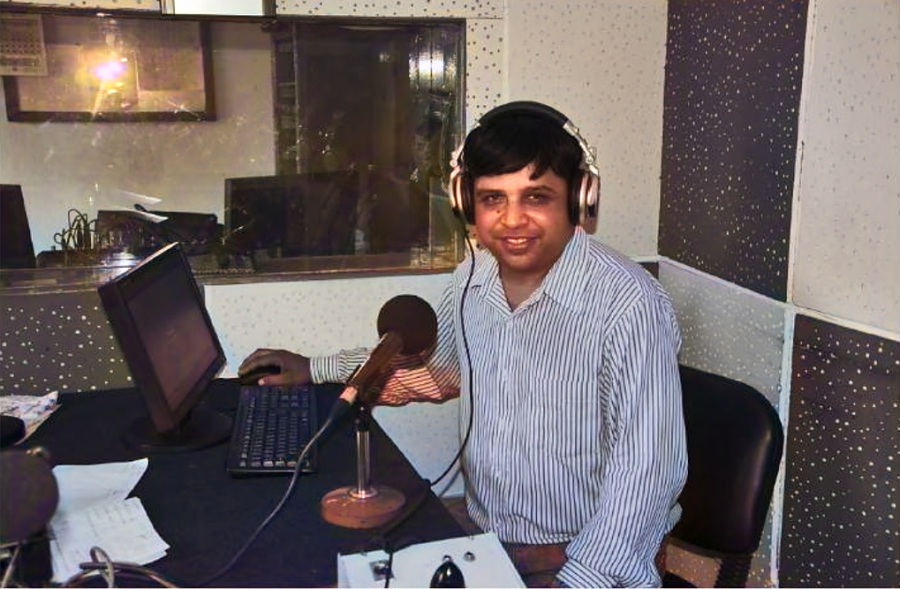Culture & Lifestyle
The voice and the talent behind Dear Kalyan
Radio personality Kalyan Gautam has carved his own path in Nepal’s rapidly changing media industry and has been the host of ‘Mero Katha’, a popular radio programme, for more than two decades.
Ankit Khadgi
It was 2002 when Kapil Devokta first started listening to the radio programme hosted by Kalyan Gautam, aka Dear Kalyan. Back then, the internet and smartphones were not yet mainstream, and television and radio were the most common and widely available means of entertainment.
But in Devkota's remote village in Sulikot in Gorkha's Barpak, owning a radio was a luxury that a few people could afford.
“If we wanted to listen to radio programmes, we had to walk for an hour to the bazaar, where a few rich households owned radio sets,” he recalls.
But Devkota made that arduous one-hour journey every week so that he could listen to Kalyan Gautam’s voice on the radio.
“There was something magical about his voice. It was commanding yet soothing. The stories he recited in his radio programme deeply touched the souls of his listeners. As listeners, we could relate to the characters’ stories. We smiled in their happiness, and we cried in their grief,” says Devkota. “His programme enchanted us so much that soon my friends and I collectively saved money and bought a radio in our village just to listen to his programme.”
Hosted by Kalyan Gautam, widely known by his stage name Dear Kalyan, ‘Mero Katha’ is one of the longest-running radio programmes in the country. It has been broadcasting stories of love, pain, sorrow, rejection, and resilience every week through radio since 1996.
A brainchild of Gautam, the programme has changed over the years along with the prompt changes that have shaped our society. When the programme first aired on radio, it was called ‘Mero Katha, Mero Geet’. Now it’s just ‘Mero Katha’. The show also has hopped from one radio station to the other. It now broadcasts via Image FM and Gautam’s personal YouTube channel, which has 83,000 subscribers. But what has remained the same is the programme's core concept and the voice behind the programme—Kalyan Gautam.
For several years, Gautam received an average of 300 to 400 letters every week from his listeners. In the letters, listeners poured their hearts and wrote deeply personal stories. But ever since social media and the internet became widely accessible, Gautam has relied on his social media accounts to get people's stories. And even though the number of people sending him their stories has reduced, he still gets a significant number of letters weekly to continue to run the show. The majority of those who send him letters are Nepalis living abroad. However, his process of selecting stories to read on his programme remains unchanged.
"If a story excites me, I reach out to the sender and ask for more details with evidence to back up the story. I then rewrite the story and turn it into a script for the programme and record it,” says Gautam, who now lives in New York, where he moved to with his family in 2014. “Sometimes, it amazes me how much trust my audience has in me. I mean, they readily share the intimate details of their private life with me—a stranger. I think this is a testament to how much people love my show."
Gautam was in his early twenties when he first started the show. A native of Dang, Gautam started working in the radio sector at a young age. He felt that the country's radio programmes lacked immersive content.
“The nature of most of the programmes was very traditional. There were many call-in programmes where the audience could interact with the hosts, but they had to be pre-recorded. It was only when our radio stations adapted frequency modulation (FM) technology that the whole gamut of radio programmes and their content changed,” Gautam says.
As more radio stations started adopting FM technology, the market expanded. In 1996, Gautam came up with an idea to create a one-of-a-kind show that focused on telling stories of everyday people. In Eastern societies like ours, the tradition of telling stories has always existed since time immemorial. Many stories have been passed on from generation to generation, making the tradition of storytelling one of the important agents of socialisation in our society.
When Gautam started pitching his idea to executives of radio stations, many didn't find his concept promising.
“No radio station believed that people would be willing to share their personal stories of loss, love, and resilience. But I knew that if we could gain people's trust, they would share their stories with us. I knew that all we had to do was to win the confidence of our listeners, then they would willingly share everything,” he adds.
Eventually, after a lot of convincing, Gautam was able to get the air time for his show on Radio Nepal 100 MHz. The first personal story he narrated in the show was of his friend recovering from drug addiction. As the story had a personal touch, people liked the new concept and welcomed his show with open arms, making it an instant hit. And since then, finding stories has never been an issue, Gautam shares.
But why is it that so many people are ready to share their deeply personal stories with Gautam—a person they barely know? What pushes them to have the courage to publicly display their emotions to the programme's listeners who are spread across the world?
Gautam believes that people want to be heard and feel validated. He thinks that the majority of people who send him their stories are those who do not have access to safe spaces to be vulnerable.
“Since the inception of my show, I have told my audience to only share their stories with me if they have no one in their life they feel comfortable sharing things with. But sadly, as our society doesn't allow people to be vulnerable, many people come to me and share their stories. For many of them, I think, writing down their stories and sending them to me is their only safe option available to articulate their emotions," says Gautam.
What Gautam says is true—for many of his audience, his show has become a place to vent anger, frustrations, and unhappiness. In one of the chapters of ‘Voicing Subjects Public Intimacy and Mediation in Kathmandu’—a book written by Laura Kunreuther, Associate Professor of Anthropology at Bard College—Laxmi Devi, one of the persons who shared her personal story with Gautam in the past, says, “Before hearing Kalyan Gautam, the urge to write was not in my heart. Even if I did write, there was nobody to read it."
Given the impact the programme has been able to make, 'Mero Katha', even after 25 years since it first aired, continues to draw listeners every week. Gautam regularly uploads his programme on his YouTube channel, and each episode receives an average of 50,000 views.
“YouTube has allowed me to continue my programme even after relocating to the US. Nepalis living in Malaysia, the Middle East, and other parts of the world make up most of my YouTube audience. They regularly reach out to me if I don’t upload stories on time, which motivates me to remain active on YouTube,” says Gautam.

The comment sections on the videos in his YouTube channel are full of numerous praises and applause from listeners. Many thank him for continuing to produce the show for all these years.
“Namaste Dear Kalyan. I am an avid listener of your programme. I don’t know why, but I can’t fall asleep without listening to your show. I work throughout the day, and once I am done with my daily chores, I listen to your show,” one of his regular listeners from Malaysia wrote in one of Gautam's recent episodes.
Gautam believes that for many listeners, just listening to stories of strangers serves as a reminder of how we are not alone in our grief and that many are experiencing similar emotions. This is why, he thinks, the majority of his programme's audience prefers to listen to the stories instead of sending their own stories for reading.
“Some of my listeners have messaged me saying that listening to hardships of other people in my programme has encouraged them to be brave and face their own challenges," claims Gautam.
While Gautam's weekly programme continues to draw listeners, its popularity is nowhere near what it used to be. One of the reasons for that is the sheer abundance of content out there for people to consume. As a result, 'Mero Katha' has seen its audience numbers shrink in the last few years.
Some regular listeners say that the programme no longer has to charm it once did.
“While I always take my time out to listen to every new episode that comes out, I don’t think the show has the same appeal it had until a few years ago. Back then, the show had a freshness, and that made it very engaging," says Devkota.
Gautam, who moonlights as a businessman and a writer, admits that the show's popularity has been waning for years now. But that’s something he has accepted gracefully, he says.
“No one can remain relevant and famous for a lifetime. I accept that my show isn’t as popular as it used to be, but the fact that it still attracts people—even after 25 years of operation—is a big achievement," adds Gautam, who’s currently working on a fiction book based on the story of Chinese immigrants. "I think there’s hardly any other Nepali radio programme that has sustained for such a long period."
For Gautam, the programme is his most prized possession.
"For many people, the show has been a source of motivation for them to face their life's adversities with bravery," says Gautam. "I will continue making the programme until people stop sending me their personal stories."




 9.88°C Kathmandu
9.88°C Kathmandu















